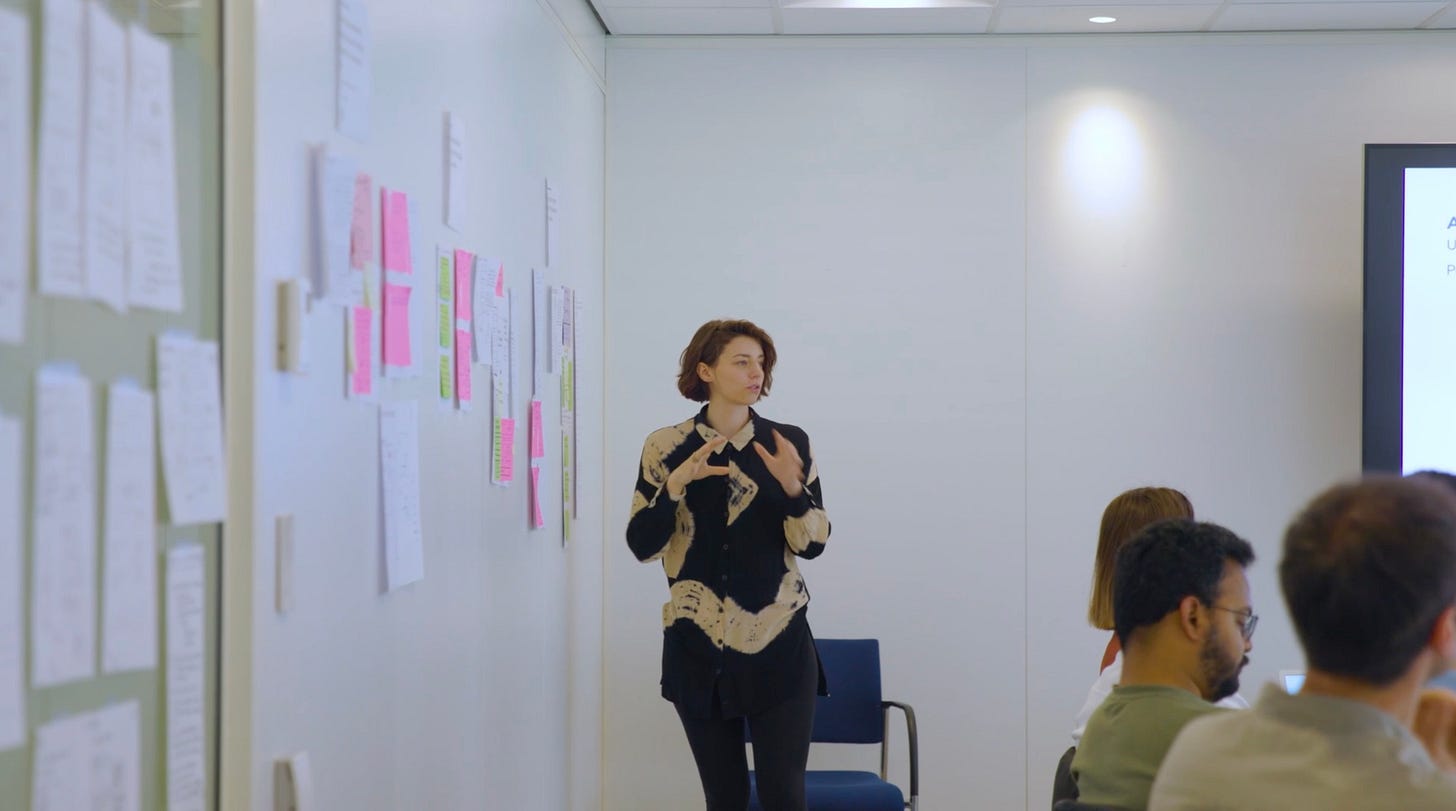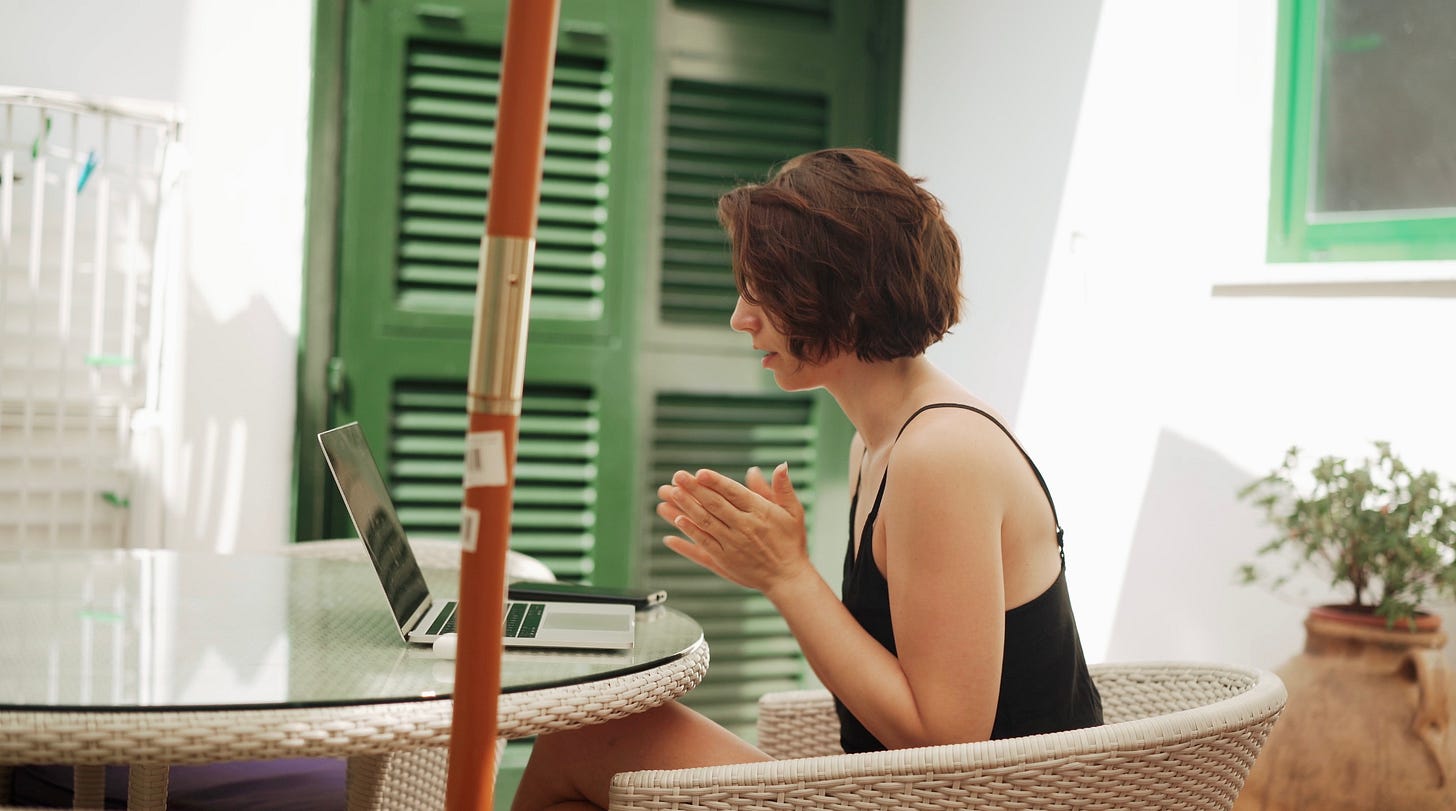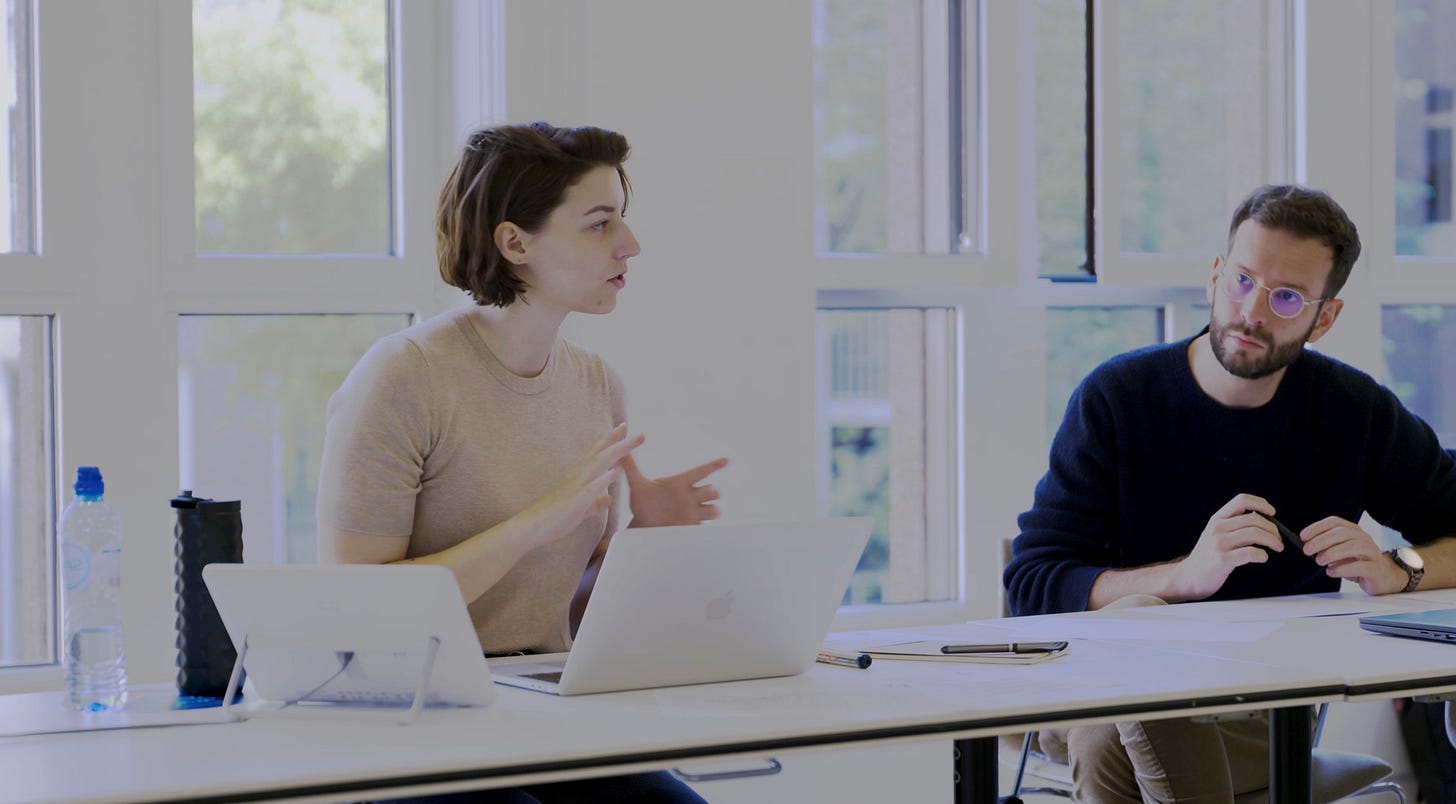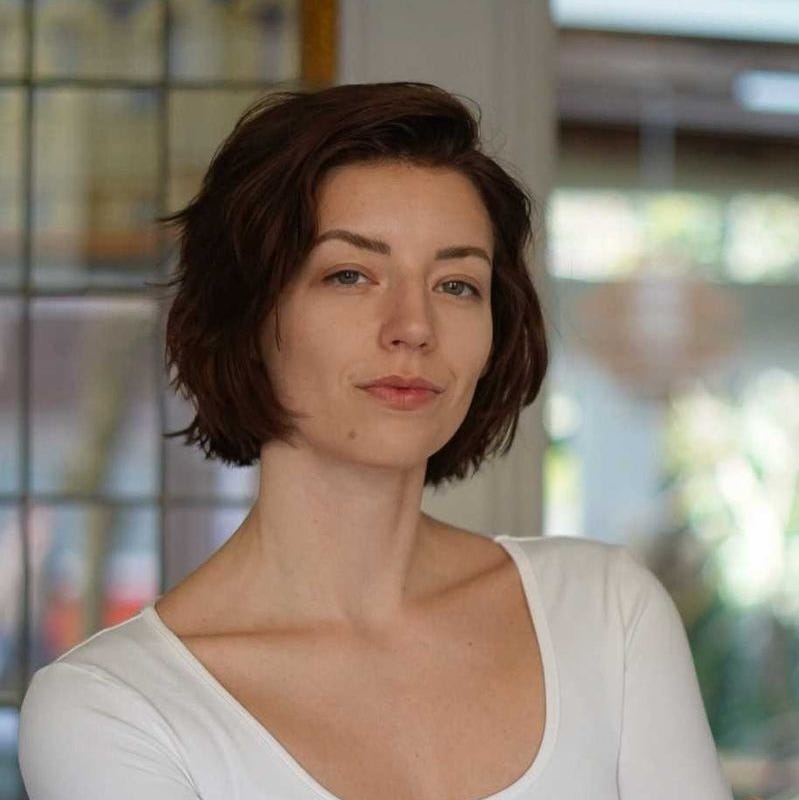Shaping the future of Booking.com
Our interview with Miranda Slayter, Principal Designer at Booking.com
Hi, it’s Arek! Welcome to Fundament, a newsletter that enables growth in UX and product design. Not subscribed yet? Join for free now:
This article records my conversation with Miranda Slayter, Principal Designer at Booking.com and Content Creator at UX Survival Guide. We chatted during the WaysConf conference in September 2024. We discussed how Miranda shapes Booking's vision for the next five years, how she measures the success of her work, her take on the future of UX and Product Design, and her thoughts about dark patterns. Happy reading!

Arkadiusz Radek: Let’s start with an easy one. Can you tell our readers about your background? How did you become a designer?
Miranda Slayter: My background is in Computer Science. I started as a front-end developer. My university degree was 50% development and 50% design, or at least that's how I designed it. However, development jobs were just ripe for the taking, so I started working with startups in my first year of university, and I did that for about three years.
But I hated it so much. And I think it had a lot to do with the environment of having the design shipped over the wall, and then I was just developing what I didn't necessarily agree with. Since I wasn't a part of the process, I thought the designs were pretty terrible and wanted to try my hand and do better than what I was seeing.
So, I shifted to design through freelancing. I gained some small mom-and-pop experience to get my ground in design, and then I ended up at an agency as an interactive designer.
Do you think designers should code? Or do they perhaps limit their creativity with that knowledge?
I think it's hugely beneficial, especially when starting as a designer and working closely with developers. You can speak their language, so you can work with them to figure out a solution if whatever you proposed initially doesn't really fit.
On the other hand, there’s a certain point where it can be a con because you have to turn off the limitations. When, for example, you're doing more visionary work or future-facing work where you don't want to think too much about the constraints of the platform or whatever capabilities exist today.
You have been at Booking for quite a while now. What did you do before joining this team?
I've been at Booking for seven years now. Before that, I worked at an in-house agency for a healthcare company in the US. We had our own app and website, but we worked in an agency model where requests came in from different parts of the organization. Before this, I worked at an actual design agency with various clients, from individual photographers to industrial equipment companies.
How did you move to Europe and end up at Booking?
I didn’t move to Europe specifically for Booking. My initial plan was to travel to Europe for two weeks. But a few things happened back home, and I felt like I didn't really have any ties here anymore. So, I quit my job, canceled my apartment lease, and canceled all my bills. I moved all my big stuff to my grandma's garage and decided to just travel to Europe until my money ran out. But I didn’t have a lot of money, so I applied for a job in a bunch of places in Barcelona, Zurich, and the UK but haven’t been hired anywhere.
Booking reached out initially when I graduated from the university in 2013. They wanted to fly me to the Netherlands to interview, but I wasn’t ready. I was barely 21, and this was getting real too quickly for me. So I didn't take them up on that, but they were in the back of my mind for that reason, so when I was 24 and in Europe, I decided to reach out.
We had a short phone interview when I was at the windmills in Zaandam, the Netherlands. After this, they invited me to a full-day interview at their headquarters, and by the end of the day, they had given me the job.
That’s an incredible story. Let’s fast-forward to seven years later. How’s the team structure at the design department at Booking? What’s the ratio of designers to engineers and product managers?
We are product teams, or product squads, if you will. A typical team consists of one designer, one product manager, and five engineers. Of course, there’s a bit of flexibility to those numbers, especially engineers, but it’s an average. We have more technical teams where a designer might be there part-time.
In general, Booking is quite a large organization, with hundreds of designers. We also have dedicated organizations for research and content writing. Researchers and writers sit more horizontally across what we call tracks, which consist of many teams.
Do you manage people?
I don’t have any direct reports anymore. I work very closely with managers to help upskill people. I prefer to help and influence without the paperwork.
Booking is like any of the big FAANG companies. Once you’re a senior designer, you must decide on your next role. You either go to the management track or continue up the IC track, and then you could be a manager and a senior manager or a lead designer and then a principal designer. So I went up the IC track. I've been a lead designer and then a principal designer. My current role is the highest within the company, where I can contribute individually. I primarily focus on the strategic side of things, working very closely with our product and higher-level stakeholders to define the company's direction.
How do you measure the success of your and your team’s work?
My team is relatively green. I work on the product vision team, so I'm responsible for owning the company's vision. And we're still 100% experimenting with measuring success because we've had a lot of operational change.
A lot of the stuff we've proposed has then been prioritized and implemented. That's one way. The other way is how frequently our assets are utilized. So, I create a lot of frameworks, and then I also assist different departments and business units within the company in using them. My participation with them and the completion of their milestones through my frameworks is another way. It's like an enablement objective.
Can you shed more light on your role and responsibilities?
Sure! We actually had zero plans for the team after presenting the product vision to our leadership in June of 2022. But it ended up having such a huge impact on them that we shared it with all employees a few months later. My focus quickly swapped from creation to enablement, helping different parts of the business better connect their work with the overarching vision and strategy. Booking took the vision that we proposed and sliced it up into five smaller pieces, where each piece turned into a wave of investment into those topics. They even shifted the organizational structure so these priorities could better fall within the teams. But it doesn’t exactly mean that now everything is seemingly planned for the next five years, and we could leave. We might not be responsible for the delivery of the vision, but we are responsible for the facilitation.
We have all been taught that copying features from our direct competitors won’t guarantee instant success. However, in your talk at the conference, you mentioned that you have copied three or four high-performing features from your competitors. My question would be, how did you do the research to make sure these features would also be successful in your own platform?
As I said before, Booking has a large research department. We regularly conduct both competitive and market analyses to ensure we are at a benchmark with our competition which also analysing what users on other platforms are finding most valuable.
Do you have any plans to implement AI-based features at Booking?
Oh yeah! I'm leading a project that examines all the sporadic Gen AI solutions that have popped up in the organization and tries to integrate them into one unified strategy. We even recently released something, and it was done a bit under the pressure that our leadership was feeling from the board or the shareholders because one of our main competitors was coming out with an LLM-based feature. So, we’ve made a travel planning assistant. It’s available only in the US for now, but you can chat with it and ask for recommendations for your travel.
Do you use AI at work?
Absolutely! It’s kind of my brainstorming buddy since my role is very independent, and I work pretty isolated. We have an internal tool that is still in beta, but essentially, it lets me search all our databases and repositories to find the information I’m looking for. Let’s say I need research insights on some topic, and it will summarize it for me or link me to available documents. I also use widely available AI assistants. I recently used Miro to summarize a workshop I led for 30-40 people. Just imagine the amount of all the stickies I’d had to go through by myself!
Booking has a reputation for being a product-led organization. How far or close is the design strategy from the product strategy?
It’s true. Booking is very product-led and very business-driven. But because I’ve been there for so long, I’ve seen a huge shift in how close design has gotten to the product strategy side of the org. So, as I previously mentioned, the ownership of the product vision only started in 2022. And that was the first time the design was part of a long-term strategy conversation. First even thought!
Now, we have a senior director of UX who advocates for doing things the right way, not only serving pretty images. But we've got a long way to go in terms of structuring our UX strategy specifically. Now, designers report to design managers, who report to design directors and up. And before that, we used to be a cross-disciplinary reporting organization.
However, I feel there are some gaps in our way of working and in defining the interlinking between product and design. It may have been more natural before because the product told me that these were priorities almost directly, and my performance was evaluated based on that. I think we need to do a bit more work as a UX department to better link up what UX is doing as a community to the business goals.
There’s quite a lot of UX maturity, but Booking is so big that we also have very immature parts of the business for UX. It's a very broad spectrum. But on the higher level where I'm sitting, that didn't exist before. It was just numbers, charts, data. It wasn't so much about customers, future experiences, and value.
Do you work in product trios at Booking?
I think it varies across the company. There are teams where design is undervalued, and there are other business areas where design is directly involved in shaping the strategy and priority.
Let’s completely change the gears. Don’t you think the current discussion in our industry is about the wrong things? We discuss a lot about Figma and visual design, but not enough about collaboration, strategy, and influence.
I agree with that. There's just something about the field of design that is so visual-focused, and I think that's what attracts people initially. It's not the collaboration. It's not the strategy. It's not even the problem-solving. The thing that attracts people is that they get to make pretty things. They get to create websites and apps that look cool. And that was even the case for myself!
And that can be incredibly important early in your career because that’s how you are often evaluated. But over time, it’s becoming more and more important to know more about the business side of design, impact, product discovery, and collaboration. My opinion is that with some of this AI stuff that has been popping up, the visual part will be taken away, especially with all the design systems and gen-AI. So the things that you mentioned, like collaboration, which AI can’t do, will become super important in our roles.
I think there’s not enough focus on this type of skill set because people might think it’s not “design.” “I don’t need to do that. I just wanted to make pretty stuff!” And then they hit the glass ceiling and don’t progress anymore. They either learn and adapt, stagnate, or literally switch careers.
Do you think it’s the fault of design education? Or is it maybe Figma’s fault? If you look at the agenda of the biggest design conference, which obviously is Config, there are a lot of talks covering visuals and design systems.
My personal opinion is that the only reason it's super-saturated right now is the tech wave during the pandemic. UX was a very easy industry to get into. It had a relatively low threshold, and you could do it for free or a very low cost. But also, the demand at the tail end of the pandemic, for designers was at its absolute peak.
So, I don't think it's Figma's fault, or I don't think they have a big hand in it. People are interested in the visual stuff. They consume everything that Figma comes out with, all the visual content. Maybe it’s difficult to see the value in learning the larger spectrum of skills, or perhaps it’s just that designers want to learn design, full stop.
There must be something about it. Design influencers and content creators posting about visual design get way more attention than the ones covering hardcore UX, strategy, and collaboration.
I talk about the processes and the management side of things. And I can already see, just from my numbers and my reactions, that it's very valuable, but it's very valuable to a subset of people.
I was helping mentor a designer a couple of months ago. They came to me and were really struggling with interviews. So, I asked them to show me what they presented in the interviews and why they did what they did. They didn’t know. They just made it pretty. It shocked me to my core. I was like, bro, this is 100% why you are not getting hired. That’s why I find it so important to share content that helps designers not just “do it” but explain why they did it.
Since you are working on the future of Booking, how about we look at the crystal ball and try to guess the future of our industry? What do you think will change for us in the next five years?
I think that we will see a decline in specialist roles, specifically on the visual side. We're gonna see a huge reduction, if not a total elimination of UI design and interaction design roles. Because I think the tools that are coming out that can do a lot of that stuff for us will make these roles obsolete.
I guess we'll see an influx of product design roles or whatever they end up being called. These roles require more strategic thinking, a deeper understanding of business, UX methodologies, collaboration, and pattern identification. I’m sure we’ll be utilizing AI a lot, not just in our processes, but it will change the way we design solutions as well. We’ll have to adapt to it. Technology, by definition, is something you have to adapt to because it's ever-changing.
Even though I think there will always be a place for very visually talented designers to do those designs that are more art than UX. But again, fewer and fewer because where the money is made is in utilitarian, systematic designs, like at Booking, Amazon, or Meta.
I'm sorry, but I have to ask this question about dark patterns, not specifically at Booking, but rather in general. Where's the line when the business comes to you and pushes you to do something you feel isn't okay with your morality?
It’s honestly a hard question. I would never design for a gambling app. For something, literally, your prerogative is to probably take as much money away from people as possible for relatively no investment. But I think it's a very, very gray area because if I think of Booking, the dark patterns always get shared in the news. I think it's very good that the EU is locking a lot of that stuff down and setting a standard that everybody has to abide by.
But I don't know how far you go with how much to the detriment of the user is that dark pattern. Is it kind of stressful in that moment? If I think of dark patterns, a lot of them are timely. “Only one room left. You gonna miss out. Only 10 minutes to go.” And that might be classified as a dark pattern. But at the same time, that's accurate to the supply. If you don't do it, there is an actual benefit to the user, even though it is dark. It might be stressful in that moment. But the added value is that they got the thing in the time they wanted. So I think it's just an evaluation and the moral compass of how much to the detriment of the user it is.
My last question would be about your side hustle: UX Survival Guide. What motivated you to start it out?
I was doing a lot of one-on-one mentorship in my company. I also started helping designers grow externally through ADPList, and I observed the same questions, problems, and challenges that many designers face at different levels. So, I decided to try to reach more designers with all the knowledge and experience I have gathered through my career. I was a bit scared that it might be not good enough or I was loo late to the party, but seems like it wasn’t the case. Realistically I think, what’s very unique about me is that I’ve done pretty much everything: freelancing, agency, bit of management, and now this big tech principal role. So, I feel like I'm in a very good position to help a lot of people through the different stages of their careers.
Miranda Slayter – Principal Designer at Booking.com, Content Creator at UX Survival Guide
Miranda brings over a decade of expertise in UX & Product Design to the table. Her journey has taken her from start-ups and creative agencies to her current role, where she's shaping the product vision for one of the world's leading travel companies.
She's been a guiding force for numerous designers, both in mentorship and hiring, and has empowered designers, researchers, and product managers to reach new heights in their careers.
Visit Miranda’s LinkedIn・TikTok・Website






